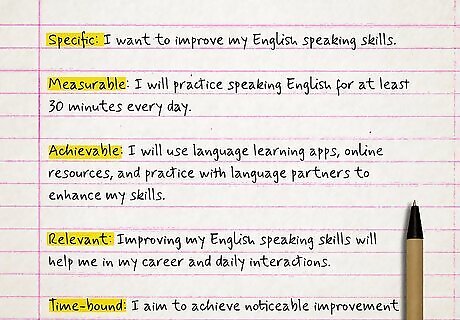
views
- Self mastery is the ability to control your emotions and impulses in order to achieve your goals. It’s similar to self-control and self-discipline.
- In order to achieve self-mastery, develop your willpower, maintain a positive attitude, and cultivate a growth mindset.
- Mindfulness, self-awareness, and getting enough rest are important tools for achieving self-mastery.
What is self-mastery?

Self-mastery is the ability to control your emotions and impulses. Like self-discipline and self-control, self-mastery involves developing your willpower in order to form positive habits and stick to them, while avoiding negative habits and temptations. This promotes your emotional and physical wellbeing, and it helps you become the best version of yourself so you can achieve your goals. Here are some examples of what self-mastery can look like: You’re calm, cool, and collected in the midst of stressful situations. If a crisis hits at work, you maintain your composure and successfully handle the problem. You’re a solid, reliable friend who everyone goes to for advice. You offer thoughtful, effective guidance without getting riled up. You’re a determined, hard-working person who achieves whatever they set their mind to. You have the resolve and willpower it takes to achieve even your most ambitious dreams.
How to Achieve Self-Mastery

Develop and exercise your willpower. Willpower involves resisting short-term temptation and gratification in order to focus on long-term goals. For example, if your goal is to save money, willpower would mean fighting the temptation to make irresponsible purchases on a daily basis. Researchers compare willpower to muscles. It can get fatigued or depleted with excessive use, just like muscles. The good news is that your willpower can also get stronger over time with consistent, healthy exercise. When possible, avoid unnecessarily tempting situations, so that your willpower doesn't get too fatigued. For example, if your goal is to cut back on alcohol for a period, you might decide not to go to a bar or nightclub during that time. Develop a game-plan to handle unavoidable temptations. For example, imagine that you're attending a friend’s birthday dinner during your period of cutting back on alcohol. Before attending, plan for the tempting scenarios. Tell yourself that, if your friends decide to order alcoholic beverages, you’ll order a mocktail. When the waiter comes to take your order, you'll be prepared to order a mocktail right away, rather than going back-and-forth on whether or not you should have a drink.

Cultivate a positive attitude. A positive mindset can help you achieve self-mastery. Positive thinking is linked to better coping skills and lower rates of depression. It can even increase your resistance to illness and your lifespan. To develop a more positive attitude, work on positive self-talk. This involves swapping out negative thoughts for more encouraging, optimistic ones, which helps you stay motivated to meet your goals. Here are some examples: Negative self-talk: I don’t know how to do this task, and I’m scared. Positive self-talk: This is an opportunity to learn something new, and it’s okay if it takes a few tries to get it right. Negative self-talk: I messed up on this task at work. I’m so stupid. Positive self-talk: Mistakes are normal and human. I can move forward and learn from this so I’ll be better next time.

Develop a growth mindset, rather than a fixed mindset. A fixed mindset means you believe you were born with a fixed set of skills and abilities. This way of thinking can be limiting because it leaves you no room for improvement. A growth mindset, on the other hand, means you believe your skills, ideas, and abilities are always evolving. You believe you have the potential to grow and become more capable with each new experience. This mindset encourages you to improve and grow, which is much more conducive to your success. Embrace challenges, rather than shying away from them. With a fixed mindset, you might avoid doing things that don’t come naturally to you because you believe you weren’t born with the necessary skills. With a growth mindset, you aren’t afraid of challenges because you believe in your ability to learn new things. Don’t get hung up on your mistakes, and give yourself some grace. Positive motivation is much more effective than punishing yourself. With a fixed mindset, mistakes make you think you’re innately incapable of doing something. With a growth mindset, you view mistakes as opportunities to learn and evolve. You recognize that mistakes are normal, which gives you the confidence to try again.

Develop self-awareness. When you’re in the process of changing your mindset and improving yourself, self-awareness is key. Some of the habits that are keeping you from success are likely unconscious, so you might not even realize you have them. In order to change these unproductive thoughts and habits, you need to become aware of them in the first place, which takes practice. Here are some tips to build self-awareness: Practice meditation. Meditation involves slowing down and paying attention to your thoughts. This helps you become more aware of what’s happening in your brain in real time. Keep a thought log. This practice involves noticing when you’re having a negative thought and writing it down. To start, fold a piece of paper into two columns. On the left side, write down the negative or unhelpful thought. Then on the right side, write down a more positive way to think about the situation. On the left side, you might write, “I’m so unhappy I’m single.” On the right side, you could write, “I’m using this time to get to know myself better.” This practice helps you become more aware of the thoughts and feelings you’re experiencing so that you can address them.

Set achievable goals. When developing self-mastery, it’s important to set achievable goals based on realistic expectations. Your goal should be clearly-defined and realistic based on your circumstances and resources. You’ll also want to pick one goal at a time. First, write out a list of all the goals you could pursue. Then, narrow down your list until you’ve landed on one achievable goal. Think practically, and consider factors like your resources, time, and experience. After you’ve picked, focus your energy on this one goal, and see it through to the end. If you’re feeling overwhelmed, try starting small. Working on tiny habits can be more valuable than you think! For example, maybe you want to focus on going to bed earlier each night for a week. Tiny goals like these help you develop your willpower through practice and repetition. If you have a bigger goal, break it up into smaller goals or steps to make it feel more doable. If your goal is to exercise more, don’t jump to doing an hour of exercise daily. Going from zero to one hundred can leave you feeling overwhelmed. Start with scheduling 10-15 minutes of exercise per day, or trying to exercise for 30 minutes twice a week. After some time, increase the amount of exercise until you meet your goal.

Implement productive and healthy routines. Changing your mindset and developing self-mastery takes time. It involves practice and repetition, and major changes don’t occur overnight. Developing a daily routine will help you stay focused and consistent over a long period of time. Also, the daily repetition of healthy habits will start to become second nature over time, solidifying into a more permanent healthy lifestyle. This will help you be the best version of yourself to achieve your goals. Use a physical or online planner to keep track of all your appointments and commitments. Establish an energizing morning routine. Reciting motivational affirmations, doing a morning workout, or preparing a healthy breakfast can set a productive tone for the rest of your day.

Practice mindfulness. Many people see self-mastery as a spiritual endeavor that involves getting in touch with yourself and finding inner-peace. Mindfulness is a popular practice to develop these skills. It involves focusing on the present moment and staying aware of your thoughts, sensations, and surroundings. Beyond its spiritual benefits, mindfulness is also a powerful technique to increase your willpower and self-control. It teaches you to have greater command over your impulses and helps you regulate your emotions. Practice mindfulness meditation. Sit or lie down in a quiet place and focus on what you’re experiencing. Feel the flow of your breath, and observe any thoughts that come up without judgment. Ground yourself throughout the day. Sensory grounding involves focusing on what you’re experiencing to stay in the present moment. If you start to stress or anxiety pulling you out of the present moment, practice the 5-4-3-2-1 technique. Look at the space you’re in, and try to name 5 things you can see, 4 things you can touch, 3 things you can hear, 2 things you can smell, and 1 thing you can taste. This helps you stay present in your current surroundings, and it stops anxiety from taking over.

Make sure to get enough rest. Diligence and productivity are important for achieving goals, but getting time to rest and recharge is equally important. Research suggests that not getting enough sleep negatively affects your self-control, leading to impulsive decisions and difficulty resisting short-term temptations. Try to get at least 7 hours of quality sleep per night. This will keep your brain functioning at its fullest potential so that you can achieve self-mastery and reach your goals. Implement a relaxing nighttime routine. Meditating, journaling, or reading can help you unwind after a busy day and get to sleep earlier. Avoid looking at screens close to bedtime. Research shows that blue light from your phone suppresses melatonin, which is the hormone that makes you feel sleepy at night.

See a therapist or counselor. If you’re struggling with implementing these tips on your own, don’t be discouraged! Impulse control, self-discipline, and emotional regulation are tough to achieve, and sometimes it takes the help of a professional to truly get on track. Plus, certain mental health conditions like ADHD and OCD can cause difficulties with these skills. Getting help for these conditions can ease your symptoms and get you feeling your best so you can work toward self-mastery. Ask a trusted friend or family member for a referral if they work with a therapist, or check online directories to find a therapist. Take your time researching and contacting potential therapists before making a choice. It can take time to find the right match for you!
Benefits of Self-Mastery

Self-mastery helps you reach your fullest potential and achieve your most ambitious goals. Research shows that key aspects of self-mastery like willpower and self-control are linked to positive life outcomes. These include greater financial security, improved physical and mental wellbeing, and lower rates of substance abuse. When you’re in charge of your own emotions and impulses, you can build the life you want and achieve anything you set your mind to! Self-mastery helps you gain financial security. Because you’re more in control of your impulses, you're less likely to make irresponsible purchases, which helps you save up. Self-mastery makes you a great romantic partner. Because you’re less likely to act impulsively on irritability or impatience, you have more harmony in your relationships. Self-mastery helps you achieve your professional goals. Because it teaches you discipline and diligence, you’ll be less likely to procrastinate, and you won't let unhealthy habits weigh you down.













Comments
0 comment